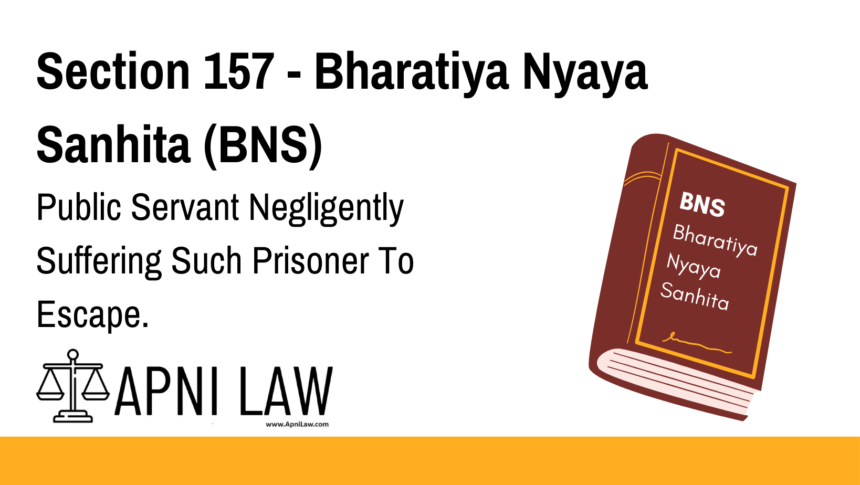Code – Section 157 BNS
Whoever, being a public servant and having the custody of any State prisoner or
prisoner of war, negligently suffers such prisoner to escape from any place of confinement in
which such prisoner is confined, shall be punished with simple imprisonment for a term
which may extend to three years, and shall also be liable to fine.
Explanation of Section 157 BNS
Section 157 BNS deals with negligence by a public servant that leads to the escape of a State prisoner or a prisoner of war. Unlike Section 156 BNS, which penalizes intentional escapes, this section applies when a prisoner escapes due to carelessness or negligence of the responsible public servant.
Key Elements of Section 157 BNS
- The accused must be a public servant
- This includes police officers, jailers, military officers, and any government employees responsible for the custody of prisoners.
- The prisoner must be a State prisoner or a prisoner of war
- State Prisoner: Someone detained for crimes against the sovereignty of India.
- Prisoner of War (PoW): A captured soldier or combatant from an enemy force.
- Negligence Must Be Proved
- The escape must have occurred due to carelessness, oversight, or failure to follow proper procedures.
- There is no requirement of intent to let the prisoner escape.
- Punishment
- Simple imprisonment for up to 3 years, AND
- Fine (at the court’s discretion).
Illustrations of Section 157 BNS
Example 1: Unlocked Prison Cell
A jail officer forgets to lock a prison cell properly, and a State prisoner escapes. Since the officer’s negligence caused the escape, he is guilty under Section 157 BNS.
Example 2: Inadequate Security Measures
A police officer in charge of transporting a prisoner fails to assign proper security personnel, allowing the prisoner to escape. This is a clear case of negligence, making the officer liable under Section 157 BNS.
Example 3: Ignoring Standard Protocols
A military officer neglects to verify security measures before leaving his post, leading to a prisoner of war escaping. Since this happened due to negligence, the officer is punishable under Section 157 BNS.
Common Questions and Answers on Section 157 BNS
1. What is the key difference between Section 156 BNS and Section 157 BNS?
- Section 156 BNS: Punishes intentional escape of a prisoner by a public servant (severe punishment – life imprisonment or up to 10 years).
- Section 157 BNS: Punishes negligence leading to a prisoner’s escape (milder punishment – up to 3 years imprisonment).
2. Is negligence enough to convict someone under this section?
Yes, but the prosecution must prove that the escape occurred due to the public servant’s negligence (e.g., not locking a cell, ignoring security measures, failing to monitor prisoners).
3. Can a public servant avoid punishment if the escape was accidental?
If the escape was truly accidental and not due to negligence, the public servant may not be held liable. However, courts will determine whether reasonable care was exercised.
4. What is the maximum punishment under Section 157 BNS?
- Simple imprisonment for up to 3 years, AND
- Fine.
5. Can a public servant be dismissed from service for negligence under this section?
Yes. A conviction under Section 157 BNS can lead to departmental action, suspension, or even dismissal from government service.
Conclusion
Section 157 BNS ensures that public servants responsible for prisoners remain vigilant and do not allow escapes due to negligence. While the punishment is less severe than Section 156 BNS, it still imposes legal consequences for careless conduct.
For more legal insights, visit ApniLaw today! 🚀








